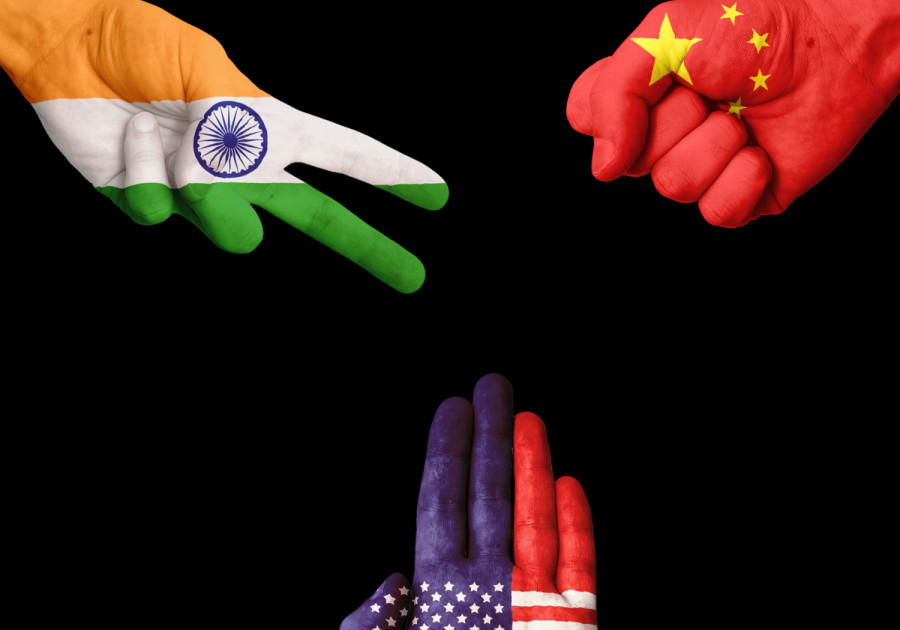Columns
A tale of three countries
Nepal could turn into a geopolitical and geostrategic playground of India, China and the United States.
Geja Sharma Wagle
After the United States unveiled its Indo-Pacific Strategy in June 2018 and the Nepal government moved to have the Millennium Challenge Corporation (MCC) Compact endorsed by Parliament, it set off a heated debate whether the deal was good for Nepal or not. Co-chairman Pushpa Kamal Dahal and some influential leaders of the ruling Nepal Communist Party have severely criticised the strategy and the compact terming them anti-national and a conspiracy of the US against Nepal.
Given Nepal’s geopolitical sensitivity and geostrategic importance, the US and emerging powers and immediate neighbours, India and China, have been attaching high priority to the Himalayan republic to extend their political, diplomatic, strategic, security and economic influence. In fact, they have also increased their financial assistance and development and military budget to Nepal.
The Indo-Pacific Strategy has interestingly referred to Nepal as an emerging defence partner. According to a report, the US has chosen Nepal as part of the State Partnership Programme that supports the security agencies starting from this year. In 2019, it introduced a new law, Asia Reassurance Initiative Act, focusing on growing security challenges such as the South China Sea, terrorism in Southeast Asia and human rights situation and refugee issues of Tibet which have direct security and strategic implications in Nepal. The US, through the Millenium Challenge Corporation, has agreed to provide a $500 million grant for Nepal’s infrastructure development. This is the first time the US had accorded that kind of importance since the bilateral relations started in 1947. What’s more, the US has been increasing its military budget to support the Nepal Army every year.
Not only the US, but northern neighbour China has also significantly elevated its relations with Nepal to extend its influence in line with its interests. President Xi Jinping visited Nepal and announced a significant policy outline with regard to Nepal-China relations. The two countries agreed to upgrade their comprehensive partnership to a strategic partnership that depicts the strategy of China and priority of Nepal. In the realm of international relations, strategic partnership is broader and multi-dimensional cooperation in strategic, defence and security affairs in addition to social, economic and cultural dimensions.
President Xi announced substantial financial support including rail and road connectivity as requested by Nepal. He emphasised security and defence cooperation during his visit. Nepal and China signed the Mutual Legal Assistance in Criminal Matters Treaty and have agreed to sign an extradition treaty in the near future. In 2017, Nepal signed the Belt and Road Initiative (BRI) which is a mega project for infrastructure development and connectivity for and between Asia and Europe. It has the potential to change the traditional geopolitics and geo-economics of the world. The BRI is both an opportunity and a challenge for Nepal. Nepal needs to transform the challenges into opportunities and implement the BRI projects in line with the national interest and priority to achieve its dream of development and prosperity while maintaining good relations with India and the US.
Taking into consideration the US’s growing strategic interests in Asia-Pacific, China has also promulgated some policies and strategies focusing on the region. China considers the increasing interests and influence of the US in the Asia-Pacific region as a threat. China proclaimed a comprehensive security policy focusing on the Asia-Pacific region in January 2017 which is similar to the US Indo-Pacific Strategy.
It has also issued another security document, China's National Defence in the New Era, following the promulgation of the Indo-Pacific Strategy. China has been establishing close military and security cooperation with Nepal’s security agencies, and has been increasing its military assistance to Nepal. Until a few years ago, China was far behind India and the US with regard to military assistance to Nepal, but today it has overtaken them.
India claims it has a traditional sphere of influence in Nepal given its centuries-old close and cordial relations, therefore, it has a higher stake. Nepal and India share an open border, and both countries have equally high-security concerns and threats. India’s concerns in Nepal are not just limited to strategic and security affairs, but extend to important political, diplomatic, economic, social and cultural spheres too. India wants to further extend its influence minimising the growing influence of China and the US. Prominent international relations thinker, Henry Kissinger, has opined that India and China are the centre of gravity of the emerging new multipolar world order, which will have significant implications in global politics. Noted geopolitical affairs scholar, Robert Kaplan, has also highlighted the heightening strategic and geopolitical gravity of Asia and its implications in Nepal. Moreover, he has predicted that Nepal may be the epicentre of the emerging geopolitical rivalry between the US, China and India.
Analysing the national interests and national security policies of India, China and the US, it is obvious that they have direct strategic, defence and security interests in Nepal. The emerging triangular strategic rivalry may undermine Nepal’s national interests and national security in the future as their rivalry intensifies. Given this, Nepal should thoughtfully study and objectively analyse the emerging global powers’ policies, strategies and interests, and their implications. Nepal should maintain a diplomatic and strategic balance between them, taking into consideration its national interests.
***
What do you think?
Dear reader, we’d like to hear from you. We regularly publish letters to the editor on contemporary issues or direct responses to something the Post has recently published. Please send your letters to [email protected] with "Letter to the Editor" in the subject line. Please include your name, location, and a contact address so one of our editors can reach out to you.




 8.22°C Kathmandu
8.22°C Kathmandu















